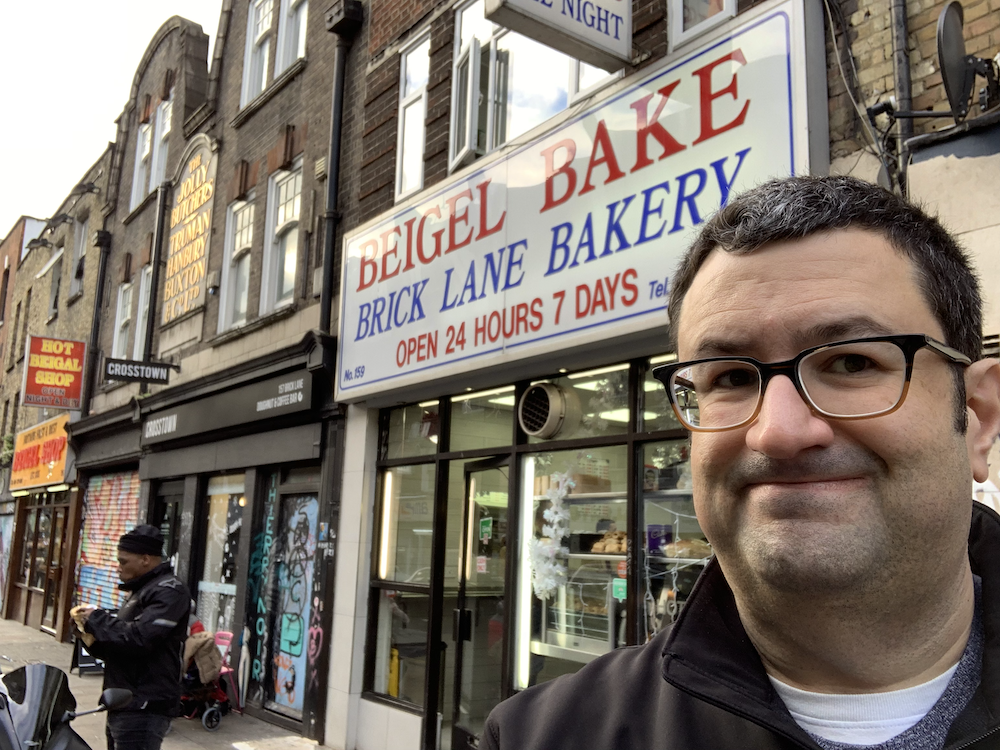The other day, I felt a bit sick and told the Complimentary Spouse I was going to have a bissel of ginger ale. He knew exactly what I meant. At long last, the Yiddishification of my shaygetz husband is complete!
Yiddish might be a dying language, but I’m not letting it go without a fight. I believe certain ideas and concepts can only be conveyed appropriately after they have been filtered through centuries of Jewish scholarship, humor, misery, and joy. Translating a Yiddish word into English is possible, but it’s like photocopying a Van Gogh — you’ll get the picture, sure, but you can’t appreciate the artistry or experience the emotional impact.
Plus, Yiddish is just fun to pronounce. There’s a hint of musicality behind all those harsh Hebrew and German consonants, which makes for an amusing contrast. It’s no wonder Klezmer is so catchy and expressive.
While I can’t speak Yiddish fluently, a few words and terms have made my way into my everyday vocabulary. Here are a few I’d like to share with you. If Britt can learn them, you have no excuse!
- Bissel: A little bit of something. Refer to the “a bissel of ginger ale” mention at the top of this post.
- Chutzpah: This one is hard to translate into English, but it basically expresses a combination of nerve, audacity, and egotism. It takes a lot of chutzpah to demand an upgrade to first class on a bare-bones economy ticket.
- Mazel Tov: Congratulations!
- Mensch: An all-around kind, generous, kind man. Note that the subtitle for this blog is “the Mensch Manifesto.” I don’t know of a female equivalent, so I usually just use menschette.
- Oy vey, oy veyismir, oy gevalt: Three general terms of annoyance, exasperation, and distress.
- Plotz: To drop from exhaustion. I’m ready to plotz after a long day of touring a new city.
- Putz: See my definition for schmuck.
- Schlep: To carry something heavy, usually used as a complaint. I’ve schlepped my luggage many times through airports.
- Schmaltzy: Overly sentimental. I don’t watch the Hallmark channel because I don’t want to see schmaltzy movies.
- Schmatta: A rag. I use this term (without judgment) for a baby blanket and (with lots of judgment) for ugly clothes.
- Schmuck: See my definition for putz.1 It’s also the unfortunate name of a jewelry store I saw in Budapest.

- Schmutz: Dirt (or a dirty substance). I call the gunk that gets in your eyes (and the dogs’ eyes) “eye schmutz.”
- Schtup: To screw, and not in the construction sense of that word.
- Schvitz: To sweat, usually because it’s too hot and humid. I schvitz in the summers in Florida.
- Shiksa and shaygetz: These Yiddish terms for non-Jewish women and men, respectively, are supposed to be put-downs but used pretty innocuously these days.
- Spiel: A long story. I like it when people get to the point without giving a whole spiel.
- Tchotchke: A trinket or souvenir. I don’t buy tchotchkes when I travel anymore because there’s no place to put them.
Footnote
- Here’s a good example of a putz or schmuck: He’s the type of jerk who would make circular references in his blog post. ↩︎
